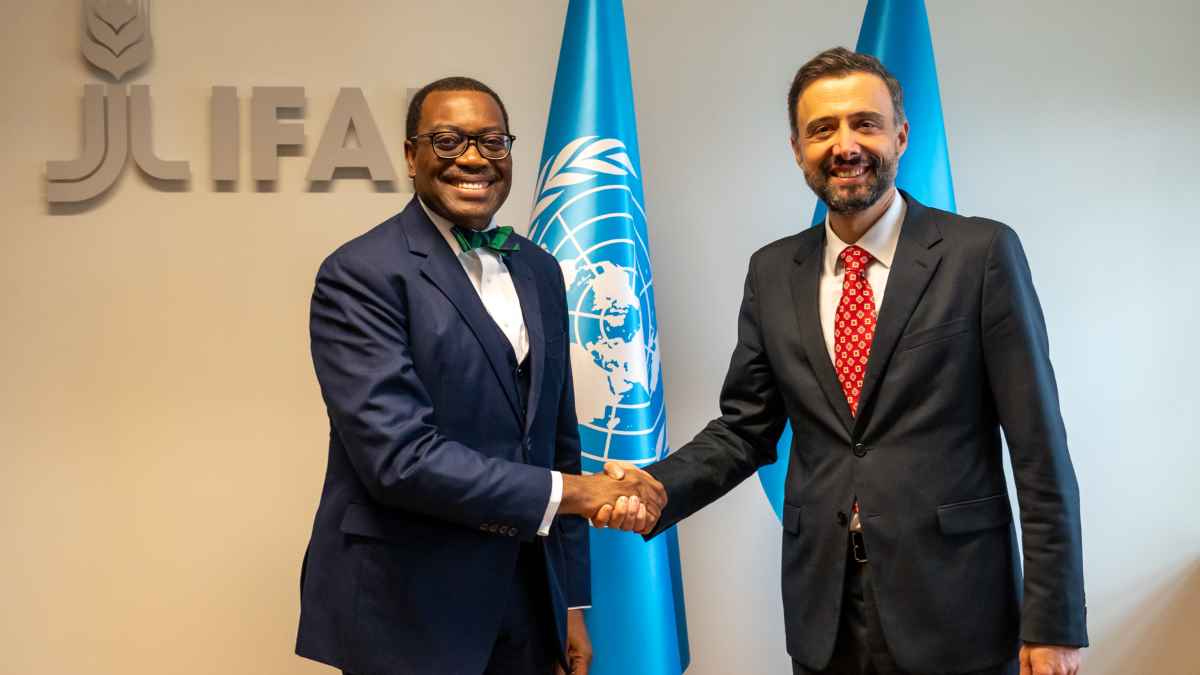The goal of the Dakar 2 conference is to mobilize political support for the structural transformation of agriculture in Africa
ROME, Italy, December 9, 2022/APO Group/ —
Eradicating hunger in Africa by 2030 is possible, said global agriculture leaders in Rome. Meeting ahead of the African Food Summit (Dakar 2) to be hosted by President Macky Sall in Dakar, Senegal, from 25-27 January 2023, President of the African Development Bank Group (https://www.AfDB.org/en) Dr. Akinwumi Adesina, the International Fund for Agricultural Development (IFAD) President Alvaro Lario and the Food and Agriculture Organization (FAO) Director General Qu Dongyu said the target was achievable.
The high-level Dakar 2 summit, themed ‘Unleashing Africa’s Food Potential,’ co-convened by the African Development Bank and the International Fund for Agricultural Research, will attract African Heads of State, Ministers of Finance and Agriculture as well as several global development partners.
The goal of the Dakar 2 conference is to mobilize political support for the structural transformation of agriculture in Africa, following renewed global interest in the sector, and the fallout of Russia’s invasion of Ukraine which has led to a significant rise in the cost of food production and imports.
Adesina said, “It is inexcusable that a continent with 65% of the world’s most arable land and abundant water resources, would still suffer from food insecurity. The summit is a critical global effort to systematically and proactively help Africa achieve Zero Hunger.”
According to the Bank chief, “We have the technologies, platforms, and resources to change the status quo by energizing the private sector, scaling up food production for millions of African farmers, unlocking finance for farmers and agricultural SMEs, and transforming the agriculture and food value chains.”
The summit is a critical global effort to systematically and proactively help Africa achieve Zero Hunger
While congratulating the African Development Bank on its historic and largest ever ADF16 donor replenishment, IFAD President Alvaro Lario acknowledged the Bank Group’s leadership and the decades-old partnership between the institution and the Bank.
The African Development Bank Group and IFAD account for 55% of all multi-development assistance to agriculture in Africa. As co-conveners of the Africa Food Summit in 2023, the Bank Group and IFAD will work on policy frameworks and food and agriculture delivery compacts.
According to the conveners, performance-based compacts with African governments, development partners, and the private sector, that meet clear food self-sufficiency targets, will be at the core of the Dakar 2 Africa Food Summit.
FAO Director General Qu Dongyu said long-term partnerships and joint resources with the African Development Bank Group will help leverage and catalyze agricultural projects across the continent.
“We must work together on the whole agricultural value chain of food production, food processing, and food marketing in a complementary, pragmatic and results-oriented way. Ensuring food security is the end game,” he said.
Recent collaboration between FAO and the African Development Bank Group includes the identification and preparation of projects in Tanzania and Equatorial Guinea, and technical development of blue economy programmes in Cabo Verde, Côte d’Ivoire and Morocco; climate-smart agricultural training, and multi-stakeholder dialogues on the Bank’s Desert to Power and Great Green Wall initiatives.
The January 2023 Africa Food Summit will also focus on scaling access to technologies and finance for agriculture SMEs and smallholder farmers, increased productivity, and the development of seed, storage, electricity, transport logistics and infrastructure.
Distributed by APO Group on behalf of African Development Bank Group (AfDB).


 Energy4 days ago
Energy4 days ago
 Business4 days ago
Business4 days ago
 Business4 days ago
Business4 days ago
 Energy2 days ago
Energy2 days ago
 Business4 days ago
Business4 days ago
 Business4 days ago
Business4 days ago
 Energy3 days ago
Energy3 days ago
 Energy3 days ago
Energy3 days ago












